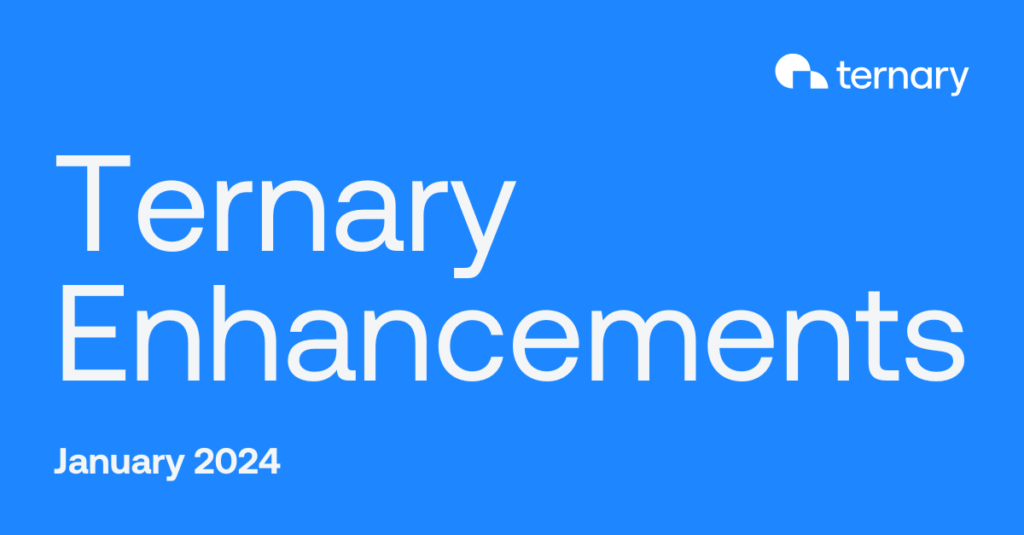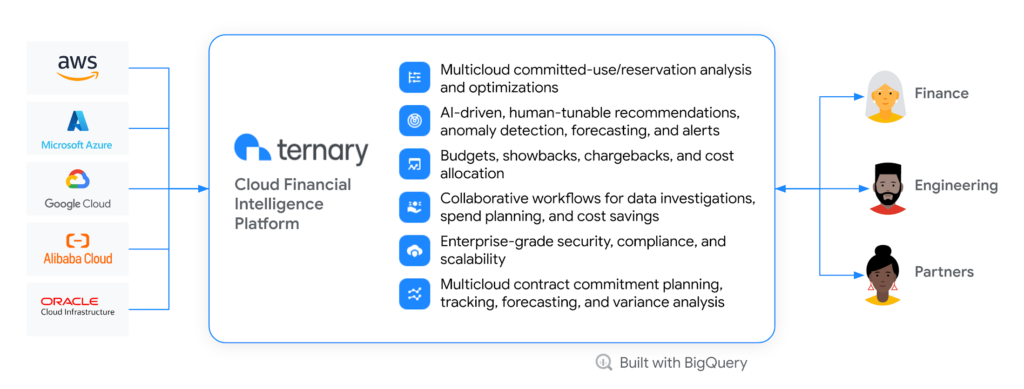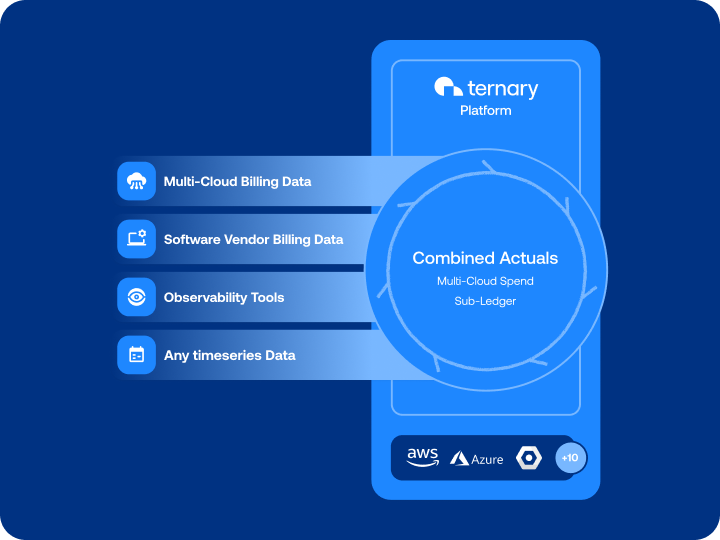Ternary is the only FinOps-native solution that enables Google Cloud Platform (GCP) customers to unlock the strategic value of their cloud investments. A FinOps Certified Platform, Ternary empowers organizations to establish cloud cost transparency, improve cost and usage efficiency, and foster communication between teams.
Let’s dive into why Ternary is the leading FinOps platform for GCP.
Built for GCP first
Before incorporating Ternary, our founders were some of the earliest FinOps practitioners. In the fall of 2018, while working at LiveRamp, they led the company’s migration to Google Cloud Platform. Our founders containerized their applications, moved 100 petabytes of Hadoop, and built a reliable infrastructure API. During the migration process, they quickly realized their GCP costs didn’t match their planned budget. That’s when they discovered the benefits of adopting FinOps best practices.
As practitioners, our founders faced the same challenge that many organizations are experiencing when it comes to tooling. Almost all cost management and FinOps solutions in the market run on Amazon Web Services (AWS) and build features for AWS first. These solutions invest minimal resources into their GCP capabilities—and it shows. Our founders recognized this shortfall as a market opportunity. It was a chance to help customers and partners maximize the business value of their GCP and multi-cloud investments. And that’s how Ternary was born. Ternary launched in February 2021 as the dedicated third-party FinOps platform for GCP. Today, Ternary is a multi-cloud platform that supports all major cloud providers: GCP, AWS, Microsoft Azure, Oracle Cloud Infrastructure, and Alibaba Cloud.
For GCP, built on GCP
More than just building for GCP first, we live and breathe Google Cloud at Ternary. We made the conscious decision to build our platform on Google Cloud infrastructure. We wanted a platform built to scale, so we invested in Google BigQuery as our serverless data warehouse.
With BigQuery, we can store large amounts of data—structured and unstructured—and easily query that data. BigQuery’s flexible data-loading methods, coupled with its security and governance controls, enable us to easily marry cost and utilization data while maintaining data integrity across customer and partner tenants. The Ternary platform ingests, normalizes, and cleanses the data from your cloud billing files and existing toolset (e.g., Snowflake, Datadog). (Read more about how Ternary is built with BigQuery.) Internally, we need to manage and control our cloud spend, just as our customers and partners must. There is no other FinOps-native company that understands your GCP cost drivers and challenges like we do. We’re in this together.
Why choose a dedicated FinOps platform
As a Google Cloud Partner, we complement and extend the capabilities of Google’s cost management toolset (commonly referred to as native tools). If you’re just starting your cloud journey and operating in only one cloud, native tools can meet your needs. Other customers require greater customization and flexibility, have moderate to advanced cost use cases, and want the ability to manage spend across their multi-cloud and containerized environments. At that point in their cloud journey, they explore third-party solutions like Ternary.
Customers and partners using GCP native tools tell us that they want a single pane of glass into their cloud cost and usage. They can get the visibility they need only by investing effort, time, and money into building dashboards leveraging Looker Studio and a combination of GCP native tools (e.g., Active Assist, FinOps Hub, etc.). To create a custom dashboard or re-create one of the published examples, they need to clone the GitHub repository and use the built-in code editor with Cloud Shell.
For stakeholders who are not experienced with GitHub and coding, like your finance team, this can be a daunting task. Additionally, these GCP tools are intended for project owners and billing administrators. To use them, you may need to grant additional permissions to stakeholders in your company, which poses a security risk. With Ternary, you get an easy-to-use platform that provides complete cloud cost transparency, all with the access control you need.
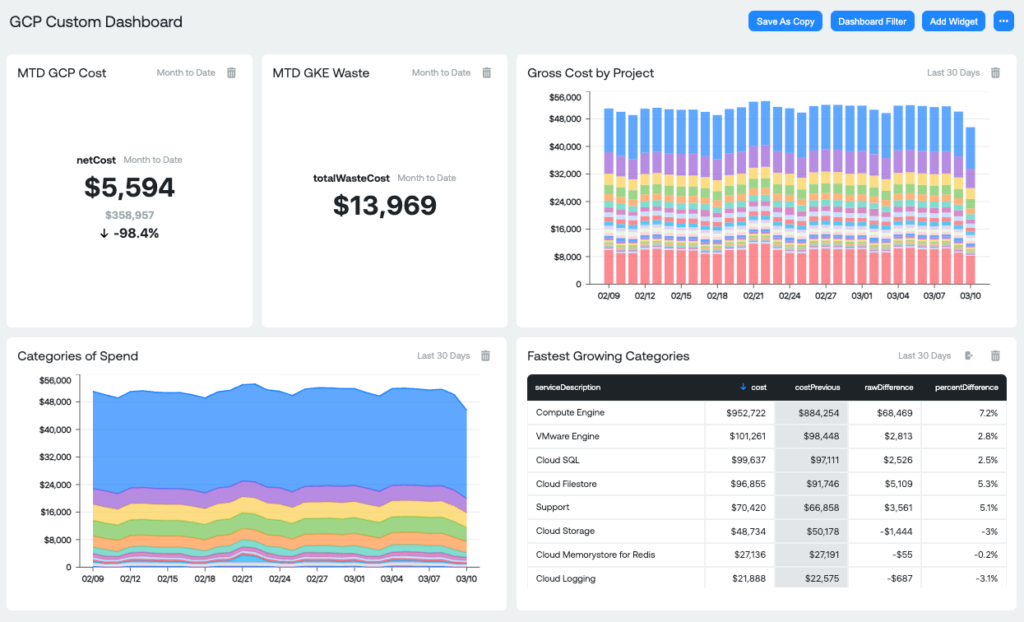
What makes Ternary the leading FinOps platform for GCP
To highlight why Ternary is the leading FinOps platform for GCP, we’ll approach our capabilities in the order that you may utilize them.
- Our team of FinOps Certified Practitioners will begin by identifying your use cases and pain points. After demonstrating how Ternary perfectly aligns with your FinOps needs, we’ll discuss pricing. While your GCP bill may have caught you off guard in the past, our invoice won’t. Ternary offers transparent and predictable pricing with a fixed-fee subscription based on your cloud spend tier. We don’t charge for overages or professional services, ensuring clear and consistent costs.
- Ternary gives you the flexibility to choose the deployment option that best suits your business, whether it’s a SaaS solution or a self-hosted platform. We understand that regulatory and data compliance requirements may necessitate keeping your data in-house. With Ternary, you have the freedom to make the choice that works for you.
- Once you deploy Ternary, you will next configure your data sources. Ternary will collect data from GCP and containers, along with other data sources (e.g., Snowflake, Datadog). Here, Ternary offers a unique and powerful capability: agentless Kubernetes monitoring. We’ve heard from customers that deploying agents to manage Kubernetes cost and usage data can be frustrating and time-consuming. Ternary is agentless. With Ternary, you can manage and optimize Google Kubernetes Engine (GKE) cost and usage without the headache.
- The Ternary platform provides immediate value, starting on day one, with our intuitive cloud cost labels. You can easily map your Google project IDs to an array of custom labels (e.g., business unit, environment, application, etc.) without needing a consultant’s help. Whether you are in finance, engineering, or on the FinOps team, you can query and visualize data in a way that makes sense to you.
- Ternary’s cost allocation engine enables you to drive accountability for cloud spend by reassigning charges from one business entity to another. Cost allocation is important for organizations that want to perform accurate chargeback or showback to their respective teams. Our platform empowers you to allocate cloud costs not just within a GCP bill but among all your cloud bills.
- Ternary provides ML-powered, human-tunable anomaly detection capabilities. You can choose to use the ML algorithms to identify anomalies or you can bypass the algorithms with prescriptive alerting thresholds. It’s important to filter out the noise and focus on the changes in spend that are impactful to your business. Ternary’s alerting rules can be customized by account, projects, services, and more.
- Incorporating case management workflows, Ternary fosters communication between teams. Any user (e.g., finance, engineer, etc.) can create a case to collaborate and discuss a data point in the platform. For example, when anomalous activity is detected, you can open a bi-directional Jira case directly from Ternary, to have the engineering team investigate and take the appropriate action.
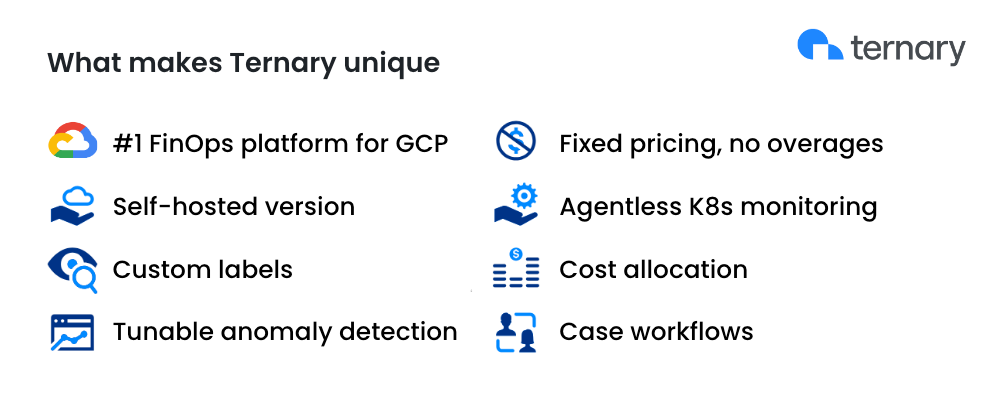
Ready to learn more?
We hope you found this blog article helpful in understanding why Ternary is the leading FinOps platform for GCP. Feel free to contact us if you have any questions.
Learn more about how Ternary can help you optimize your organization’s cloud spend.

